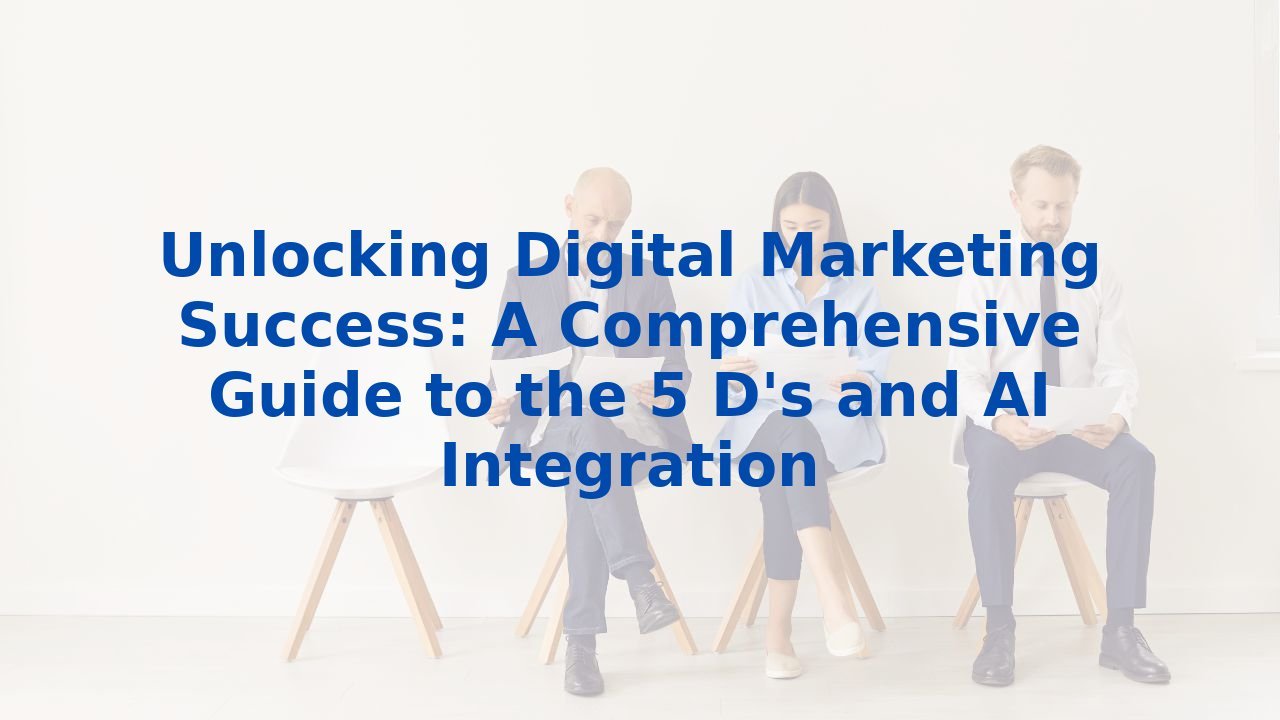Unlocking Digital Marketing Success: A Comprehensive Guide to the 5 D's and AI Integration
Unlocking Digital Marketing Success: A Comprehensive Guide to the 5 D's and AI Integration
Introduction to Digital Marketing
In today's digitally driven ecosystem, digital marketing stands as a beacon for businesses seeking to connect and engage with their target audiences. It thrives on leveraging a myriad of online channels, embracing the advancements of technology and data to drive advertisements, promote products, and ultimately, foster relationships. At the core of this intricate landscape lie the five Ds of digital marketing—Digital Devices, Digital Media, Digital Technology, Digital Data, and Digital Platforms—which serve as foundational elements for executing successful marketing strategies.
The Role of AI in Digital Marketing
As we delve deeper into digital marketing, one cannot overlook the seismic shift that artificial intelligence (AI) is bringing to the table. AI is not merely a buzzword; it's an innovation that is redefining efficiency, personalization, and the analytical capabilities of marketing teams.
1. Efficiency and Automation
Repetitive tasks, like email marketing campaigns or social media postings, often consume precious hours that could be spent on strategy and creativity. AI tools can automate these processes, allowing marketers to redirect their energy towards activities that require human insight and creativity. This shift toward automation enables a more productive workflow, paving the path to unlocking greater potential within an organization.
2. Data Analysis and Insights
With the vast pools of digital data available, making informed decisions hinges on effective analysis. AI empowers marketers to sift through this deluge of information, drawing meaningful insights that drive targeted customer segmentation. By harnessing data analytics, teams can optimize their strategies and make agile decisions, positioning themselves as market leaders.
3. Personalization and Customer Experience
In an era marked by personalization, AI's prowess in analyzing customer behaviors and preferences stands out. AI tools can tailor content and experiences to meet individual needs, heightening customer engagement and loyalty. This level of customization transcends mere transactions; it cultivates relationships that lead to sustainable success.
4. Predictive Analytics
The future is written in the data of today. AI excels at forecasting trends based on historical data, helping marketers stay one step ahead. By anticipating customer needs and adjusting strategies accordingly, businesses can fine-tune their inventory management and optimize ad spending, resulting in improved campaign performance and profitability.
5. Content Creation and Optimization
Content is king, and AI can act as a valuable ally in its creation and optimization. Whether suggesting topics or even writing basic articles, AI ensures that content remains consistent and engaging. By automating these processes, brands preserve their relevancy in an ever-changing digital landscape.
6. Ad Targeting and Optimization
Maximizing return on investment (ROI) is a priority for any marketer, and AI plays a critical role in achieving that goal. By analyzing user behavior, AI helps deliver more accurate, targeted ads that resonate with the right audience. This optimization of advertising strategies ensures better outcomes while staying within budget constraints.
7. Customer Service and Chatbots
The advent of AI-powered chatbots revolutionizes customer service by offering round-the-clock support. These intelligent systems can handle inquiries, provide personalized interactions, and significantly enhance customer engagement. As a result, businesses can experience improved conversion rates and customer satisfaction.
Benefits of Training Employees for AI
Integrating AI into business processes marks just the beginning. The true power of AI lies in how effectively your team can leverage these tools. Training employees for AI is not merely an investment in technology; it is an investment in human capital. Here are some of the key benefits:
- Enhanced Collaboration: Equipping employees with AI knowledge empowers them to collaborate seamlessly with these technologies, maximizing the tools' potential.
- Improved Decision-Making: Employees proficient in AI can navigate data insights with finesse, leading to informed, strategic choices.
- Increased Efficiency: Adept employees can execute automation processes effectively, allowing them to focus on innovation and strategy.
- Better Adaptation: Familiarity with AI accelerates adaptation to new tools, ensuring the organization remains agile in the fast-paced digital marketing world.
Conclusion
The convergence of AI and digital marketing is not just an evolution; it's a revolution. By automating tasks, delivering rich insights from data, and crafting personalized customer experiences, AI transforms the pathways through which businesses connect with their audiences. However, the journey does not end with technology; it flourishes with empowered teams ready to harness its capabilities. As digital marketing continues its trajectory into the future, the integration of AI will not just be advantageous—it will be essential for those seeking to thrive and lead in a competitive landscape. Stay ahead, stay curious, and embrace the digital future.



